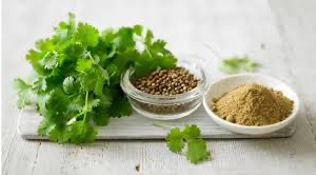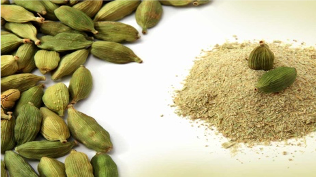Herbs & Spices from Krissy Billiczky our resident food searcher
Today’s herb is Coriander
 Coriander is an annual herb in the family Apiaceae and is related to parsley, carrots, and celery.
Coriander is an annual herb in the family Apiaceae and is related to parsley, carrots, and celery.
Coriander is generally thought to be native to the Mediterranean and parts of southwestern Europe. Experts believe its use dates back to at least 5,000 B.C. References to coriander can be found in Sanskrit writings, and the seeds were placed in Egyptian tombs.
Coriander is also called as Chinese parsley or cilantro in the USA.
Scientific research is limited but studies suggest that coriander has the following benefits:
- may help lower blood sugar levels
- rich in immune boosting antioxidants so can have anti-cancer and anti-inflammatory effect on the body
- can benefit heart health – coriander extract appears to act as a diuretic, helping your body flush excess sodium and water, this may lower your blood pressure
- thanks to its antimicrobial compounds, coriander can help fight some infections and foodborne illnesses
- coriander seeds can also help fight urinary tract infections
- antioxidants in coriander may protect your skin from aging and sun damage and also help treat mild skin rashes
Coriander is safe to eat for most people and fresh coriander is delicious in salad and as garnish on different dishes.
Coriander can be found in fresh or dried herb format and also as seeds.
Today’s spice is Cardamom
 Cardamom is a spice with an intense, slightly sweet flavour that some people compare to mint.
Cardamom is a spice with an intense, slightly sweet flavour that some people compare to mint.
It originated in India but is available worldwide today and used in both sweet and savoury recipes.
The seeds, oils and extracts of cardamom are thought to have impressive medicinal properties and have been used in traditional medicine for centuries.
Scientific research is limited in some areas but there are confirmed health benefits of cardamom:
- may lower blood pressure, most likely due to its antioxidant and diuretic properties
- may contain cancer fighting compounds – more human studies needed to confirm
- high in antioxidants so has anti-inflammatory effects on the body
- may help with digestive issues and can help reduce stomach ulcers
- may be able to kill common mouth bacteria and prevent cavities – used in ancient remedies to improve oral health
- may have antibacterial effects to help fight infections – especially in oil format
- may improve breathing by stimulating better oxygen uptake and relaxing air passage to the lungs in humans and animals
- may help decrease blood sugar levels
- may decrease elevated liver enzymes, triglyceride and cholesterol levels. They may also prevent liver enlargement and liver weight, which reduces the risk of fatty liver disease
- may help with anxiety
Cardamom is safe to eat for most people when used for cooking, however, cardamom supplements should be avoided by children as well as pregnant and breast-feeding women.
If in doubt, as ever, please seek advice from a healthcare or medical professional.
Cardamom can be found in powder or pod format as well as an oil.
Cardamom powder is delicious added to baking and cooking both savoury and sweet dishes.
